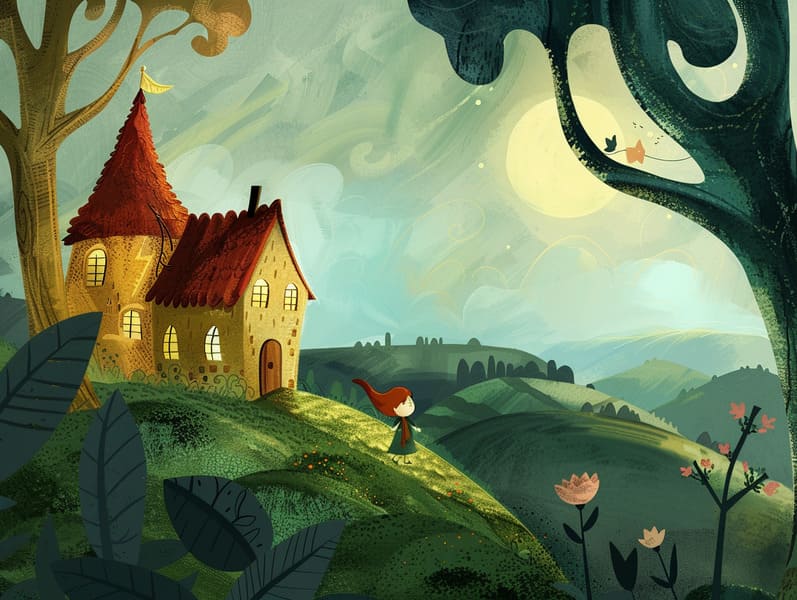Discovering the Enchantment of Bedtime Fables: Building Beloved Occasions with Kids
Discovering the Enchantment of Bedtime Fables: Building Beloved Occasions with Kids
Blog Article

Bedtime is a important time for parents and children. It’s a opportunity to calm down, get cozy, and enjoy the wonder of nightly stories.
For decades, evening stories for little ones have been a beloved custom, offering more than just a way to fall asleep. They provide an occasion for relationship building, knowledge acquisition, and encouraging imagination.
The Key Benefits of Bedtime Stories
Sleep stories for kids do more than a way to close the day. They play a important role in a child’s growth and in strengthening the adult-child tie. Here’s why they are significant:
1. Bonding Time: Bedtime reading fosters a special bonding time between kids and their parents. It’s a moment of closeness that helps children feel appreciated and content.
2. Vocabulary Building: Hearing tales helps children develop their language skills. They acquire new expressions, understand form, and improve their hearing and analytical skills abilities.
3. Imaginative Skills: Nightly stories lead them to imaginary worlds, promoting dreams. They see characters, settings, and adventures, which fuels their innovation.
4. Emotional Growth: Stories for children often involve characters facing issues and reactions. These narratives help kids understand and navigate their own feelings, enhancing emotional understanding.
5. Cognitive Skills: Absorbing a narrative helps children develop awareness, memory, and critical thinking skills. They pick up to follow lines of thought, remember components, and anticipate results.
Making Storytime a Bedtime Ritual
Developing a night-time practice that has reading aloud stories is manageable and gratifying. Here’s how to make it a prized part of your evening practice:
1. Choose a Relaxing Place: Identify a comfortable place where you and your child can nestle in without distractions. A cozy bed or a quiet reading nook works great.
2. Establish a Routine Time: Choose a routine time each night for bedtime reading. Consistency helps children be ready and makes the routine more sustainable.
3. Choose Age-Fitting Stories: Identify tales that fit your child’s understanding. Toddlers might like picture books with basic stories, while elementary kids may enjoy novels with more intricate narratives.
4. Engage with the Story: Make the tale come alive by incorporating different voices and accents, adding story sounds, and getting your child to participate. Ask stuff about the story to involve them.
5. Set a Tranquil Atmosphere: Lower the lights, use calm voices, and create a quiet environment to help your child calm down.
How to Discover Bedtime Stories
There are numerous places where you can find wonderful bedtime stories for children. Here are some ideas to look at:
1. Kids’ Literature: Explore your free bedtime stories local library or bookstore to find a great selection of bedtime stories for kids. Looking through the aisles together can be a enjoyable activity that also helps children to pick stories that they like.
2. Web Resources: There are many online platforms that offer free bedtime stories. Sites like children's story websites provide a variety of short stories for kids that you can read on screen. These platforms are great for finding new and different stories without paying.
3. Story Apps and Audiobooks: For nights when you’re too drained to read, look into audiobooks or storytelling apps. These can provide a relaxing voice to read your child a story, ensuring they still get their bedtime story fix. Apps often offer engaging components that can involve them further.
4. Tailored Stories: Make your own stories based on your child’s interests. Personalized stories can be especially engaging and meaningful. You can incorporate your child in the writing process, making them a part of the adventure.
The Good of Short Stories
Short stories for kids are very beneficial for bedtime. They provide all the good points of longer stories but are more concise, making them perfect for preparing for sleep before sleep. Here’s why short stories are a ideal choice:
1. Straightforward: Compact stories are clear and easy for kids to get, even after a long day. They can speedily grasp the narrative and enjoy the story without getting lost.
2. Rapid Interest: Brief tales swiftly engage children, holding their involvement and creativity. This makes them suitable for keeping bedtime practices manageable yet enjoyable.
3. Various Options: Brief tales offer for variety in your bedtime storytime. You can find a different story each night, keeping the habit exciting and exciting for your child.
4. Time Management: For busy parents, concise narratives are a easy way to verify children still get their nightly dose of storytelling. They fit well into a full schedule while still offering the full good aspects of a bedtime story.
The Fascination of "Read Me a Story"
The simple phrase, “Tell me a story,” can reveal a world of magic for children. Agreeing to this request not only satisfies a child’s need for attention and engagement but also builds lasting occasions. Here’s why it’s amazing:
1. Connection: Narrating to your child develops a deep emotional link. It’s a time for togetherness, sharing, and bonding.
2. Ritual: Forming a bedtime story ritual creates a prized tradition that children enjoy every night. It’s a habit that can be passed down through generations.
3. Mutual Learning: As you read, you’ll notice your child’s evolution and maturation. Their reactions, reactions, and understanding of the stories change, offering insights into their developing minds.
4. Protective Space: Bedtime stories provide a safe space for children to examine emotions, face fears, and find comfort in the reliable presence of a parent.
In Summary
Nightly tales for children are a powerful tool for fostering a child’s advancement and establishing unforgettable experiences of connection.